Corporate Social Responsibility: Some Critical Questions for Australia
Researching how food presentation and menu variety components of quality of food influences on costumer’s choice of restaurant
30 Pages15698 Words194 Views
Added on 2023-06-13
About This Document
This article questions whether governmental support and enthusiasm for CSR is appropriate, given the neo-classical view of corporations as entities devoted to the maximisation of shareholder wealth. It examines legislation that already imposes obligations on companies to behave in a socially responsible manner, and looks at some of the recent CSR initiatives in Australia. The motivations for CSR are examined, highlighting the issue of protection of corporate reputation and the government's motives for its encouragement of CSR. Finally, the proper role of CSR in Australia will be analysed.
Corporate Social Responsibility: Some Critical Questions for Australia
Researching how food presentation and menu variety components of quality of food influences on costumer’s choice of restaurant
Added on 2023-06-13
ShareRelated Documents
CORPORATE SOCIAL RESPONSIBILITY:
SOME CRITICAL QUESTIONS FOR
AUSTRALIA
HELEN ANDERSON*
Introduction
Corporate social responsibility (CSR) is currently one of the most
discussed topics by business and scholars alike. The concept has been
enthusiastically supported by three very disparate groups - by
government,l by non government organisations (NGOs) ranging from
charities to national and international industry groups, and by business
itself, in particular large corporations.2 This support comes at a time
when there is greater awareness by individuals about environmental
matters, sustainability, workplace rights and issues concerning labour in
other countries, and occupational health and safety. Rhetoric about
corporations 'giving back' to the communities that made them successful
abounds.
2
LLB (Hons) (Melb), GradDipBus (Acc), LLM, PhD (Monash); Barrister and Solicitor
(Vic); Associate Professor, Department of Business Law and Taxation, Monash
University.
There have been a number of inquiries into CSR - see Corporations and Markets
Advisory Committee, Corporate Social Responsibility Discussion Paper, November,
2005, (CAMAC Discussion Paper) available at http://www.camac.gov.au/camac
/camac.nsf/byHeadline/PDFDiscussion+Papers/$file/CSR DP.pdf, accessed 11 th April,
2006; Parliament of Australia, Parliamentary Joint Committee on Corporations and
Financial Services, COlporate Responsibility: Managing Risk and Creating Value,
June 2006, (the Parliamentary Joint Committee Report) available at
http://www.aph.gov.au/Senate/committee/corporations ctte/comorate responsibilitv/re
port/index.htm, accessed 11 th April, 2006. The Prime Minister has also established the
Prime Minister's Community Business Partnership, discussed further below. See
http://www.partnerships.gov.au/csr/comorate links.shtml
In 2000, a study by the Centre for Corporate Public Affairs and the Business Council
of Australia found around half of Australia's large companies has policies related to
community involvement, social responsibility or stakeholder engagement. More than
half of these companies had developed policies in the last decade. Centre for Corporate
Public Affairs and Business Council of Australia, 'Corporate Community Involvement:
Establishing a Business Case' (2000) 38 - 9. In 2001, Cronin and Zappala concluded
from their survey of Australia's top 100 companies that just over 70 percent of
companies surveyed had CCI policies. Caitlin Cronin and Gianni Zappala, 'The
Coming of Age of Corporate Community Involvement: An Examination of Trends in
Australia's Top Companies' (Working Paper No 6, Research and Social Policy Team,
The Smith Family, 2002), 6.
© Law School, University of Tasmania 2007
SOME CRITICAL QUESTIONS FOR
AUSTRALIA
HELEN ANDERSON*
Introduction
Corporate social responsibility (CSR) is currently one of the most
discussed topics by business and scholars alike. The concept has been
enthusiastically supported by three very disparate groups - by
government,l by non government organisations (NGOs) ranging from
charities to national and international industry groups, and by business
itself, in particular large corporations.2 This support comes at a time
when there is greater awareness by individuals about environmental
matters, sustainability, workplace rights and issues concerning labour in
other countries, and occupational health and safety. Rhetoric about
corporations 'giving back' to the communities that made them successful
abounds.
2
LLB (Hons) (Melb), GradDipBus (Acc), LLM, PhD (Monash); Barrister and Solicitor
(Vic); Associate Professor, Department of Business Law and Taxation, Monash
University.
There have been a number of inquiries into CSR - see Corporations and Markets
Advisory Committee, Corporate Social Responsibility Discussion Paper, November,
2005, (CAMAC Discussion Paper) available at http://www.camac.gov.au/camac
/camac.nsf/byHeadline/PDFDiscussion+Papers/$file/CSR DP.pdf, accessed 11 th April,
2006; Parliament of Australia, Parliamentary Joint Committee on Corporations and
Financial Services, COlporate Responsibility: Managing Risk and Creating Value,
June 2006, (the Parliamentary Joint Committee Report) available at
http://www.aph.gov.au/Senate/committee/corporations ctte/comorate responsibilitv/re
port/index.htm, accessed 11 th April, 2006. The Prime Minister has also established the
Prime Minister's Community Business Partnership, discussed further below. See
http://www.partnerships.gov.au/csr/comorate links.shtml
In 2000, a study by the Centre for Corporate Public Affairs and the Business Council
of Australia found around half of Australia's large companies has policies related to
community involvement, social responsibility or stakeholder engagement. More than
half of these companies had developed policies in the last decade. Centre for Corporate
Public Affairs and Business Council of Australia, 'Corporate Community Involvement:
Establishing a Business Case' (2000) 38 - 9. In 2001, Cronin and Zappala concluded
from their survey of Australia's top 100 companies that just over 70 percent of
companies surveyed had CCI policies. Caitlin Cronin and Gianni Zappala, 'The
Coming of Age of Corporate Community Involvement: An Examination of Trends in
Australia's Top Companies' (Working Paper No 6, Research and Social Policy Team,
The Smith Family, 2002), 6.
© Law School, University of Tasmania 2007
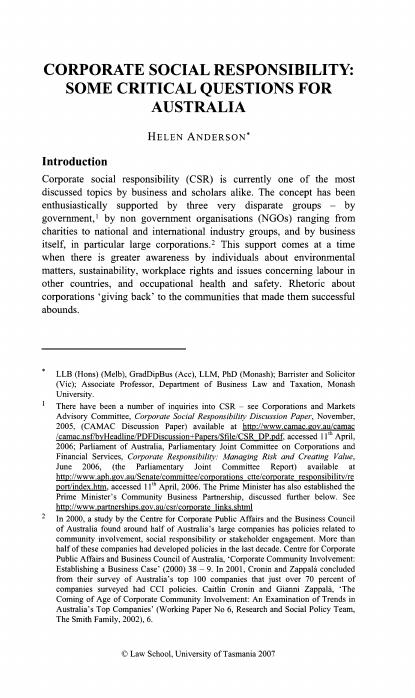
144 University of Tasmania Law Review Vol 24 No 2 2005
Much of the corporate citizenship literature, both in Australia and
internationally, looks at the superficial 'what' of CSR and examines
actions that companies can take to be good corporate citizens. 3 Other
authors delve deeper by looking at the 'how',4 and examine the variety of
ways in which companies embrace CSR - ranging from cursory
philanthropy to stakeholder engagement in the most fundamental decision
making processes of the company.
This article takes a normative approach and looks at the 'why' of CSR; in
particular, it will question whether governmental support and enthusiasm
for CSR is appropriate, given the neo-classical view of corporations as
entities devoted to the maximisation of shareholder wealth. Milton
Friedman famously decried CSR as a 'fundamentally subversive doctrine'
with the capacity to distract companies from their primary focus. It will
be asked whether responsibility for the provision of some community
services or the protection of various aspects of society and the
environment should be devolved, albeit gradually and apparently with the
consent of all concerned, to an unaccountable being, the business
community, particularly where participation is on a voluntary basis.
Corporations, especially large, successful ones, are willing participants in
CSR, for the protection and enhancement of their reputations. It is
arguable that, with the retreat of the welfare state, governments take
advantage of this to shift costs to the business sector. NGOs are also keen
to encourage CSR to ensure that their own social objectives are advanced.
However, the difficulty with reputation-driven CSR is that it might
encourage companies to engage in activities which are 'seen' to be doing
the right thing - conspicuous donations, support for high profile causes5 -
rather than the more fundamental protection of stakeholder interests, such
4
Eg David Brereton, 'Self-regulation of Environmental and Social Performance in the
Australian Mining Industry' (2003) 20· Environmental and Planning Lmv Journal 1;
Jonathan Batten, Samanthala Hettihewa and Robert Mellor, 'The Ethical Management
Practices of Australian Firms' (1997) 16 Journal of Business Ethics 1261; Robert
Kagan, Neil Gunningham and Dorothy Thornton 'Explaining Corporate Environmental
Performance: How Does Regulation Matter' (2003) 37 Law and Society Review 51.
Eg David Birch and George Littlewood, 'Corporate Citizenship Some Perspectives
from Australian CEOs' (2004) 16 The Journal of Corporate Citizenship 6; Mark
Glazebrook, 'The Social Construction of Corporate Citizenship' (2005) 17 The Journal
of Corporate Citizenship 5; Gianni Zappala, 'Corporate Citizenship and Human
Resource Management: A New Tool or a Missed Opportunity' (2004) 42 Asia Pacific
Journal of Human Resources 185; Jonathan Batten and David Birch, 'Defining
Corporate Citizenship: Evidence from Australia' (2005) 11 Asia Pacific Business
Review 293.
A cursory look at the websites of major Australian corporations shows that
environmental, health, educational and indigenous causes are most popular, along with
support for the homeless and financially disadvantaged. See further n 103 below.
Much of the corporate citizenship literature, both in Australia and
internationally, looks at the superficial 'what' of CSR and examines
actions that companies can take to be good corporate citizens. 3 Other
authors delve deeper by looking at the 'how',4 and examine the variety of
ways in which companies embrace CSR - ranging from cursory
philanthropy to stakeholder engagement in the most fundamental decision
making processes of the company.
This article takes a normative approach and looks at the 'why' of CSR; in
particular, it will question whether governmental support and enthusiasm
for CSR is appropriate, given the neo-classical view of corporations as
entities devoted to the maximisation of shareholder wealth. Milton
Friedman famously decried CSR as a 'fundamentally subversive doctrine'
with the capacity to distract companies from their primary focus. It will
be asked whether responsibility for the provision of some community
services or the protection of various aspects of society and the
environment should be devolved, albeit gradually and apparently with the
consent of all concerned, to an unaccountable being, the business
community, particularly where participation is on a voluntary basis.
Corporations, especially large, successful ones, are willing participants in
CSR, for the protection and enhancement of their reputations. It is
arguable that, with the retreat of the welfare state, governments take
advantage of this to shift costs to the business sector. NGOs are also keen
to encourage CSR to ensure that their own social objectives are advanced.
However, the difficulty with reputation-driven CSR is that it might
encourage companies to engage in activities which are 'seen' to be doing
the right thing - conspicuous donations, support for high profile causes5 -
rather than the more fundamental protection of stakeholder interests, such
4
Eg David Brereton, 'Self-regulation of Environmental and Social Performance in the
Australian Mining Industry' (2003) 20· Environmental and Planning Lmv Journal 1;
Jonathan Batten, Samanthala Hettihewa and Robert Mellor, 'The Ethical Management
Practices of Australian Firms' (1997) 16 Journal of Business Ethics 1261; Robert
Kagan, Neil Gunningham and Dorothy Thornton 'Explaining Corporate Environmental
Performance: How Does Regulation Matter' (2003) 37 Law and Society Review 51.
Eg David Birch and George Littlewood, 'Corporate Citizenship Some Perspectives
from Australian CEOs' (2004) 16 The Journal of Corporate Citizenship 6; Mark
Glazebrook, 'The Social Construction of Corporate Citizenship' (2005) 17 The Journal
of Corporate Citizenship 5; Gianni Zappala, 'Corporate Citizenship and Human
Resource Management: A New Tool or a Missed Opportunity' (2004) 42 Asia Pacific
Journal of Human Resources 185; Jonathan Batten and David Birch, 'Defining
Corporate Citizenship: Evidence from Australia' (2005) 11 Asia Pacific Business
Review 293.
A cursory look at the websites of major Australian corporations shows that
environmental, health, educational and indigenous causes are most popular, along with
support for the homeless and financially disadvantaged. See further n 103 below.
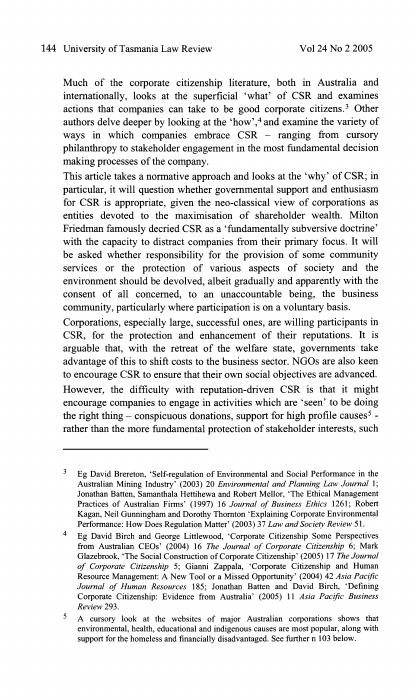
Corporate Social Responsibility
as good treatment of their employees, timely and full payment of
creditors and manufacturing of quality, safe and inexpensive products and
services. The more that government promotes the visible forms of CSR,
the more likely it is that companies will adopt these superficial measures
of good corporate behaviour, window dressed to the maximum extent,
rather than inherently sound business practices which are of true benefit
to the community. For this reason, the espousal of reputational indices,
which may support a culture of CSR 'form over substance', is to be
discouraged.
While there is an extensive international literature which looks at the
costs and benefits ofCSR to companies individually, the current debate in
Australia over CSR lacks a rigorous analysis of its costs and benefits to
society as a whole. It is assumed that with corporate reputational
enhancement flowing from schemes to benefit the community, all parties
win. But this does not take into account consideration of what
corporations could do in the alternative with their resources, which might
be of equal benefit to society. It also fails to examine the long term
consequences for society if a pattern of government retreat from the
provision of social services or the protection of vulnerable parties
becomes entrenched. It does not consider whether the money invested by
corporations into CSR achieves the corporations' stated objectives or
whether the money is spent in an economically efficient or effective way.
This article begins with a discussion of the meaning of CSR, and how
companies incorporate it into their activities. It then examines legislation
that already imposes obligations on companies to behave in a socially
responsible manner, and looks at some of the recent CSR initiatives in
Australia. Next, the motivations for CSR are examined, highlighting the
issue of protection of corporate reputation and the government's motives
for its encouragement of CSR. Finally, the proper role of CSR in
Australia will be analysed. It will be recommended that a redefined CSR
is appropriate to ensure the true protection of stakeholder interests.
CSR defined
Definitions of corporate social responsibility proliferate, although each is
generally accompanied by the disclaimer that the term is neither
universally or easily defined. 6 For brevity and simplicity, it is hard to go
145
6 Mr Jeremy Cooper of the Australian Securities and Investments Commission (ASIC)
outlined the definitional issues that arise in the area of corporate responsibility: '[t]here
are some very vexing terminology problems ... such as what a stakeholder is, what
sustainability means, what triple bottom line reporting is and what we really mean by
corporate social responsibility itself... ' Parliamentary Joint Committee Report, above n
1 [2.3]. For an extensive coverage of the development of the term in the American
as good treatment of their employees, timely and full payment of
creditors and manufacturing of quality, safe and inexpensive products and
services. The more that government promotes the visible forms of CSR,
the more likely it is that companies will adopt these superficial measures
of good corporate behaviour, window dressed to the maximum extent,
rather than inherently sound business practices which are of true benefit
to the community. For this reason, the espousal of reputational indices,
which may support a culture of CSR 'form over substance', is to be
discouraged.
While there is an extensive international literature which looks at the
costs and benefits ofCSR to companies individually, the current debate in
Australia over CSR lacks a rigorous analysis of its costs and benefits to
society as a whole. It is assumed that with corporate reputational
enhancement flowing from schemes to benefit the community, all parties
win. But this does not take into account consideration of what
corporations could do in the alternative with their resources, which might
be of equal benefit to society. It also fails to examine the long term
consequences for society if a pattern of government retreat from the
provision of social services or the protection of vulnerable parties
becomes entrenched. It does not consider whether the money invested by
corporations into CSR achieves the corporations' stated objectives or
whether the money is spent in an economically efficient or effective way.
This article begins with a discussion of the meaning of CSR, and how
companies incorporate it into their activities. It then examines legislation
that already imposes obligations on companies to behave in a socially
responsible manner, and looks at some of the recent CSR initiatives in
Australia. Next, the motivations for CSR are examined, highlighting the
issue of protection of corporate reputation and the government's motives
for its encouragement of CSR. Finally, the proper role of CSR in
Australia will be analysed. It will be recommended that a redefined CSR
is appropriate to ensure the true protection of stakeholder interests.
CSR defined
Definitions of corporate social responsibility proliferate, although each is
generally accompanied by the disclaimer that the term is neither
universally or easily defined. 6 For brevity and simplicity, it is hard to go
145
6 Mr Jeremy Cooper of the Australian Securities and Investments Commission (ASIC)
outlined the definitional issues that arise in the area of corporate responsibility: '[t]here
are some very vexing terminology problems ... such as what a stakeholder is, what
sustainability means, what triple bottom line reporting is and what we really mean by
corporate social responsibility itself... ' Parliamentary Joint Committee Report, above n
1 [2.3]. For an extensive coverage of the development of the term in the American
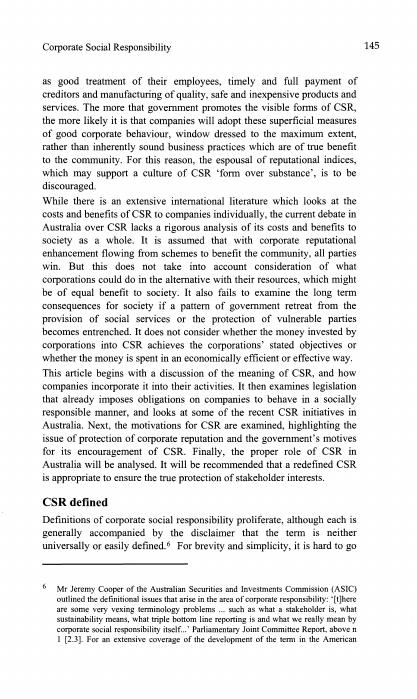
146 University of Tasmania Law Review Vol 24 No 2 2005
past Baron, who states that '[fjrom one perspective, it is the assumption
and fulfilment of responsibilities beyond those dictated by markets' .7 The
report of the Parlialnentary Joint Committee on Corporations and
Financial Services, issued in June 2006 and entitled Corporate
Responsibility: Manag"ing Risk and Creating Value, stated that
[c ]orporate responsibility is usually described in tenns of a company
considering, managing and balancing the economic, social and
environmental impacts of its activities. It is about companies assessing and
managing risks, pursuing opportunities and creating corporate value, in
areas beyond what would traditionally be regarded as a company's core
business. It is also about companies taking an 'enlightened self-interest'
approach to considering the legitimate interests of a company's
stakeholders. 8
Recognising that corporate responsibility is a multi-faceted concept the
committee makes no attempt to reach a conclusive definition. Because of
the sheer diversity of modem corporations - in tenns of size, sectors,
stakeholders, structures and strategies - the concept of corporate
responsibility can have a different meaning to different people and different
organisations. 9
The implementation of all CSR activities entails costs for all companies,
regardless of the form of those activities. One common point of
difference in definitions is whether corporate social responsibility
involves the company's core activities or is outside of those - in other
words, whether the company should be recovering the costs of the
programs or indeed be making money from them. At one end of the
spectrum are those who consider it wrong to profit from these activities,
7
8
9
literature, see Archie B Carroll 'Corporate Social Responsibility Evolution of a
Definitional Construct' (1999) 38(3) Business and Society 268.
David P Baron 'Private Politics, Corporate Social Responsibility, and Integrated
Strategy' (2001) 10 Journal of Economics and Management Strategy 7, 9.
Parliamentary Joint Committee report, above n 1 [2.7].
Ibid [2.15]. The CAMAC Discussion Paper noted that [w]hile there is an increasing
recognition and acknowledgement of corporate social responsibility (or comparable
notions such as 'corporate citizenship' or 'corporate social accountability') as an issue,
the term does not have a precise or fixed meaning. Some descriptions focus on
compliance with the spirit as well as the letter of applicable laws regulating corporate
conduct, while other descriptions concentrate on the societal impacts of corporate
activities (sometimes encapsulated in the notion of sustainability) on groups (usually
referred to as stakeholders) including, but extending beyond, shareholders. These
societal effects, going beyond the physical or social goods or services provided by
companies and returns to shareholders, are sometimes subdivided into environmental,
social and economic impacts. CAMAC Discussion Paper, above n 1, [1.1].
past Baron, who states that '[fjrom one perspective, it is the assumption
and fulfilment of responsibilities beyond those dictated by markets' .7 The
report of the Parlialnentary Joint Committee on Corporations and
Financial Services, issued in June 2006 and entitled Corporate
Responsibility: Manag"ing Risk and Creating Value, stated that
[c ]orporate responsibility is usually described in tenns of a company
considering, managing and balancing the economic, social and
environmental impacts of its activities. It is about companies assessing and
managing risks, pursuing opportunities and creating corporate value, in
areas beyond what would traditionally be regarded as a company's core
business. It is also about companies taking an 'enlightened self-interest'
approach to considering the legitimate interests of a company's
stakeholders. 8
Recognising that corporate responsibility is a multi-faceted concept the
committee makes no attempt to reach a conclusive definition. Because of
the sheer diversity of modem corporations - in tenns of size, sectors,
stakeholders, structures and strategies - the concept of corporate
responsibility can have a different meaning to different people and different
organisations. 9
The implementation of all CSR activities entails costs for all companies,
regardless of the form of those activities. One common point of
difference in definitions is whether corporate social responsibility
involves the company's core activities or is outside of those - in other
words, whether the company should be recovering the costs of the
programs or indeed be making money from them. At one end of the
spectrum are those who consider it wrong to profit from these activities,
7
8
9
literature, see Archie B Carroll 'Corporate Social Responsibility Evolution of a
Definitional Construct' (1999) 38(3) Business and Society 268.
David P Baron 'Private Politics, Corporate Social Responsibility, and Integrated
Strategy' (2001) 10 Journal of Economics and Management Strategy 7, 9.
Parliamentary Joint Committee report, above n 1 [2.7].
Ibid [2.15]. The CAMAC Discussion Paper noted that [w]hile there is an increasing
recognition and acknowledgement of corporate social responsibility (or comparable
notions such as 'corporate citizenship' or 'corporate social accountability') as an issue,
the term does not have a precise or fixed meaning. Some descriptions focus on
compliance with the spirit as well as the letter of applicable laws regulating corporate
conduct, while other descriptions concentrate on the societal impacts of corporate
activities (sometimes encapsulated in the notion of sustainability) on groups (usually
referred to as stakeholders) including, but extending beyond, shareholders. These
societal effects, going beyond the physical or social goods or services provided by
companies and returns to shareholders, are sometimes subdivided into environmental,
social and economic impacts. CAMAC Discussion Paper, above n 1, [1.1].
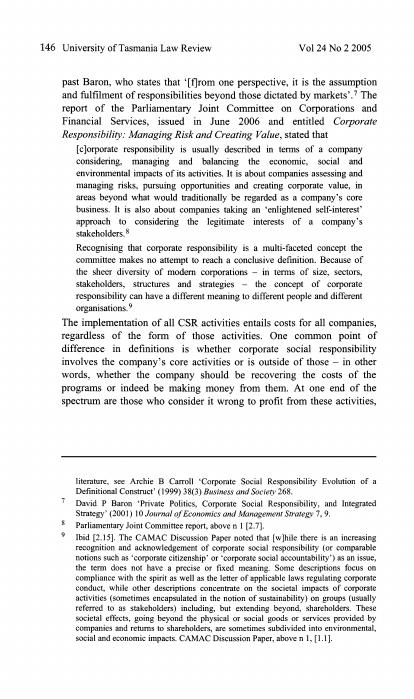
Corporate Social Responsibility
and therefore treat CSR as external to the core business of the company.
10
Indeed some definitions demand that the company's CSR activities are
less profitable than 'nonnal' corporate actions. Manne and Wallich
observed that '[t]o qualify as socially responsible corporate action, a
business expenditure or activity must be one 'for which the marginal
returns to the corporation are less than the returns available from some
other expenditure ... ' .11
At the other end are those who believe that truly successful corporate
social responsibility is embedded into a corporation's core profit making
activities and values, and goes far beyond superficial philanthropy. This
approach was mentioned with interest in the Parliamentary Joint
Committee report, where it was noted that '[e]vidence received by the
committee ... strongly underlined the importance of integrating the
consideration of broader community interests into the core business
strategy of companies, if corporate responsibility was to succeed' .12
This view is shared by a number of commentators, 13 but how widely this
view has been adopted is debatable. The CAMAC Discussion Paper
revealed research which found that
[w]hereas 54% of executives in one global survey in 2000 said that this
notion was 'central' or 'important' to their corporate decision-making, that
10 For example, Moon maintains that '[i]t is not suggested here that companies derive no
benefit from pursuing social responsibility. They may improve their reputation among
customers and among public contractors thereby. Nonetheless, the activities so
described are not directly for-profit, nor do they represent direct product advertising.'
Jeremy Moon, 'The Firm as Citizen? Social Responsibility of Business in Australia'
(1995) 30 Australian Journal of Political Science 1, 1. See further JF Vos 'Corporate
Social Responsibility and the Identification of Stakeholders' (2003) 10 Corporate
Social Responsibility and Environmental Management 141, who maintains that CSR is
an obligation to stakeholders 'to carry out actions that appear to further some social
good, beyond the interest of the firm and that which is required by law to do'.
11 Henry G Manne and Henry C Wallich 'The Modern Corporation and Social
Responsibility' (1972) 4.
12 Parliamentary Joint Committee Report, above n 1, [3.89].
13 Batten and Birch concluded that '[i]t is becoming clearer that the social (and
environmental) has to be incorporated, not as an add-on to a corporation's economic
activities, but as an essential, integral, more social redefinition of that corporation, in
order to better reflect. the rapidly changing post industrial economy we now find
ourselves operating in.' .Batten and Birch, above n 4, 293. Amongst scholars, it is
commonly emphasised that CSR is more than simple 'chequebook philanthropy',
'cause-related marketing' or business ethics. See David Birch, 'Corporate Citizenship:
Rethinking Business Beyond Corporate Social Responsibility' in Jorg Andriof and
Malcolm McIntosh (eds) Perspectives on Corporate Citizenship ( Sheffield: Greenleaf,
2001) 53, 54.
147
and therefore treat CSR as external to the core business of the company.
10
Indeed some definitions demand that the company's CSR activities are
less profitable than 'nonnal' corporate actions. Manne and Wallich
observed that '[t]o qualify as socially responsible corporate action, a
business expenditure or activity must be one 'for which the marginal
returns to the corporation are less than the returns available from some
other expenditure ... ' .11
At the other end are those who believe that truly successful corporate
social responsibility is embedded into a corporation's core profit making
activities and values, and goes far beyond superficial philanthropy. This
approach was mentioned with interest in the Parliamentary Joint
Committee report, where it was noted that '[e]vidence received by the
committee ... strongly underlined the importance of integrating the
consideration of broader community interests into the core business
strategy of companies, if corporate responsibility was to succeed' .12
This view is shared by a number of commentators, 13 but how widely this
view has been adopted is debatable. The CAMAC Discussion Paper
revealed research which found that
[w]hereas 54% of executives in one global survey in 2000 said that this
notion was 'central' or 'important' to their corporate decision-making, that
10 For example, Moon maintains that '[i]t is not suggested here that companies derive no
benefit from pursuing social responsibility. They may improve their reputation among
customers and among public contractors thereby. Nonetheless, the activities so
described are not directly for-profit, nor do they represent direct product advertising.'
Jeremy Moon, 'The Firm as Citizen? Social Responsibility of Business in Australia'
(1995) 30 Australian Journal of Political Science 1, 1. See further JF Vos 'Corporate
Social Responsibility and the Identification of Stakeholders' (2003) 10 Corporate
Social Responsibility and Environmental Management 141, who maintains that CSR is
an obligation to stakeholders 'to carry out actions that appear to further some social
good, beyond the interest of the firm and that which is required by law to do'.
11 Henry G Manne and Henry C Wallich 'The Modern Corporation and Social
Responsibility' (1972) 4.
12 Parliamentary Joint Committee Report, above n 1, [3.89].
13 Batten and Birch concluded that '[i]t is becoming clearer that the social (and
environmental) has to be incorporated, not as an add-on to a corporation's economic
activities, but as an essential, integral, more social redefinition of that corporation, in
order to better reflect. the rapidly changing post industrial economy we now find
ourselves operating in.' .Batten and Birch, above n 4, 293. Amongst scholars, it is
commonly emphasised that CSR is more than simple 'chequebook philanthropy',
'cause-related marketing' or business ethics. See David Birch, 'Corporate Citizenship:
Rethinking Business Beyond Corporate Social Responsibility' in Jorg Andriof and
Malcolm McIntosh (eds) Perspectives on Corporate Citizenship ( Sheffield: Greenleaf,
2001) 53, 54.
147
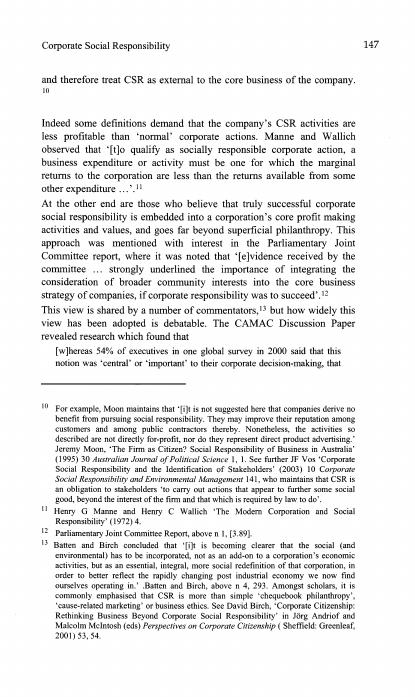
148 University of Tasmania Law Review Vol 24 No 2 2005
figure had grown by 2005 to 88% of executives surveyed. Likewise,
whereas 34% of professional investors in that same global survey in 2000
said that corporate social responsibility was 'central' or 'important' to their
investment decisions, that figure had risen by 2005 to 81 %. 14
This was noted by the Parliamentary Joint Committee who concluded that
it demonstrated 'the significant global rise of corporate responsibility as a
factor in corporate decision-making and investment practices.
Importantly, there also appears to be a global trend towards "doing"
rather than mere rhetoric.' 15
In contrast, Batten and Birch noted 16 research in 1999 which found that
only 7 percent of CEOs of top corporations viewed corporate citizenship
as central to the strategic direction of their business. Their own survey,
published in 2005, found that '[m]ost respondents defined corporate
citizenship in terms of the community activities of the corporation ... and
felt that it did not include core products or services ... or the way in
which the corporation was organised or run. ... '. 17
Indeed, a report commissioned by the Prime Minister's Community
Business Partnership 18 observed that while businesses are aware of the
big picture issues of CSR and corporate citizenship, they lack expertise
rather than commitment in implementing their CSR goals. 19
14 CAMAC Discussion Paper, above n 1, [1.1].
15 Parliamentary Joint Committee Report, [2.30].
16 Batten and Birch, above n 4, 296.
17 Ibid 300. In a case study involving BP, Glazebrook observed that 'corporate
citizenship was predominantly interpreted through the language of "community
affairs" which occupied a centralised and monetised function within BP undertaken on
behalf of the organisation, but not in conjunction with its core operations ... . By
limiting this function to a discretionary "spend" allocated outside the operational
considerations of BP's business, managers, employees and stakeholders external to the
company had been acculturated into viewing BP's corporate citizenship expressed
through a discrete, separate pot of money unrelated to core business, but spent because
of a prevailing social norm that "companies must give something back"'. Glazebrook,
above n 4, 61.
18 Jehan Loza and Sarah Ogilvie, Corporate Australia Building Trust and Stronger
Communities? A Review of Current Trends and Themes, Australian Government
Department of Family and Community Services For the Prime Minister's Community
Business Partnership, November, 2005 (the Community Business Partnership report).
Available at http://www.partnerships.~ov.au/pdf/Corporate%20Australia%20Buildin~
%20Trust%20and%20StronieflI020Communities pdf
19 '[T]hese activities generally take the form of transactive relations (involving little or no
interaction beyond the provision of money or in-kind support) rather than interactive
partnerships (involving a much greater interaction of the company with the community
or partnering organisation beyond a simple transaction of funds or equipment).' Ibid
16-17.
figure had grown by 2005 to 88% of executives surveyed. Likewise,
whereas 34% of professional investors in that same global survey in 2000
said that corporate social responsibility was 'central' or 'important' to their
investment decisions, that figure had risen by 2005 to 81 %. 14
This was noted by the Parliamentary Joint Committee who concluded that
it demonstrated 'the significant global rise of corporate responsibility as a
factor in corporate decision-making and investment practices.
Importantly, there also appears to be a global trend towards "doing"
rather than mere rhetoric.' 15
In contrast, Batten and Birch noted 16 research in 1999 which found that
only 7 percent of CEOs of top corporations viewed corporate citizenship
as central to the strategic direction of their business. Their own survey,
published in 2005, found that '[m]ost respondents defined corporate
citizenship in terms of the community activities of the corporation ... and
felt that it did not include core products or services ... or the way in
which the corporation was organised or run. ... '. 17
Indeed, a report commissioned by the Prime Minister's Community
Business Partnership 18 observed that while businesses are aware of the
big picture issues of CSR and corporate citizenship, they lack expertise
rather than commitment in implementing their CSR goals. 19
14 CAMAC Discussion Paper, above n 1, [1.1].
15 Parliamentary Joint Committee Report, [2.30].
16 Batten and Birch, above n 4, 296.
17 Ibid 300. In a case study involving BP, Glazebrook observed that 'corporate
citizenship was predominantly interpreted through the language of "community
affairs" which occupied a centralised and monetised function within BP undertaken on
behalf of the organisation, but not in conjunction with its core operations ... . By
limiting this function to a discretionary "spend" allocated outside the operational
considerations of BP's business, managers, employees and stakeholders external to the
company had been acculturated into viewing BP's corporate citizenship expressed
through a discrete, separate pot of money unrelated to core business, but spent because
of a prevailing social norm that "companies must give something back"'. Glazebrook,
above n 4, 61.
18 Jehan Loza and Sarah Ogilvie, Corporate Australia Building Trust and Stronger
Communities? A Review of Current Trends and Themes, Australian Government
Department of Family and Community Services For the Prime Minister's Community
Business Partnership, November, 2005 (the Community Business Partnership report).
Available at http://www.partnerships.~ov.au/pdf/Corporate%20Australia%20Buildin~
%20Trust%20and%20StronieflI020Communities pdf
19 '[T]hese activities generally take the form of transactive relations (involving little or no
interaction beyond the provision of money or in-kind support) rather than interactive
partnerships (involving a much greater interaction of the company with the community
or partnering organisation beyond a simple transaction of funds or equipment).' Ibid
16-17.
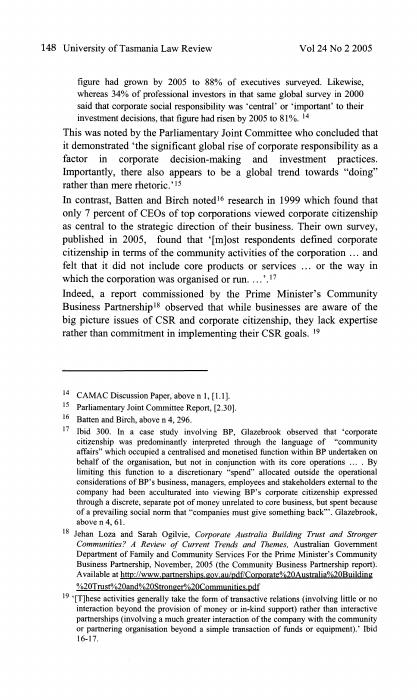
End of preview
Want to access all the pages? Upload your documents or become a member.
Related Documents
Corporate Social Responsibility and Governance Structure of Rio Tinto Limitedlg...
|13
|2991
|77
